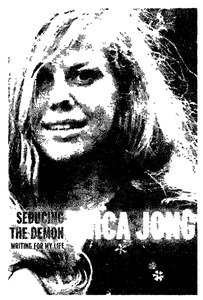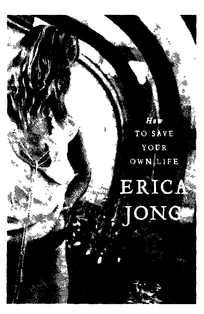Fear of Fifty (53 page)
Authors: Erica Jong

I have forgotten my readers. I have forgotten that my job is to be a voice. I have remembered only my paltry ego and its bruises. I am thinking of endings, not process. Whenever I think of endings, I get stuck.
All last summer, in an effort to lose weight and look young, I took pills to kill my appetite. I lost lots of weight, but also became so speedy I couldn't sit still. When I went off the pills, my personality seemed to fragment. I saw wild animals in the corners of my eyes. I felt a gnawing at my heart and an urge to scream in the streets. When that phase ended, I went into a valley of despair. Divided from myself, I wanted some substance to knit me back together. I drank littleâbut what did that matter since the little I drank depressed me so? The substance I needed was spirit, not spirits. I needed
myself
to finish this book, and I was finding a million ways to escape from myself.
myself
to finish this book, and I was finding a million ways to escape from myself.
Gradually, I drag myself out of bed and begin the new day. “I can't drink,” I say to myself. “I should remember that.” I have coffee, work out on the exercise bike, get dressed, and walk across the street to my office.
“Of course, I can't finish the book if I don't have myself,” I say to myself. The soul is awakened through service, and writing is my way of serving. Serving is my way of reattaching mind and spirit. Without spirit, I am dust. I had better keep my head clear of wine and pills so I can write.
This is not a boozy promise to myself. It is a fierce recognition of the truth. I have been distancing myself from the energy that keeps me alive.
The next day, I neither drink nor take pills. My mother comes home from the hospital. The next day, I neither drink nor take pills. My mother goes to the doctor to get her medication adjusted. The next day, I neither drink nor take pills. I go to lunch with friends, giving myself a rare mental health day. If the book is not coming, I'll leave it alone. Let it gather its curious crystals in the darkness.
After lunch, I go to see my mother. She is lying on top of her bed, wearing a yellow silk kimono. Her window opens on Central Parkâa human view of the park from the twelfth floorâthe tops of trees, the roof of Tavern on the Green, the skyline of Fifth Avenue. Her room is papered with chrome yellow against which pink cabbage roses dance. Scattered among the roses are paintings of babies. The wall contains all the babies, done by her able hand: Molly with her red topknot, me with my flaxen ringlets, Nana with her auburn hair, redheaded baby Claudia, dark-haired Tony and Peter, and blond Alexâall the children and grandchildren captured in sleep a month or two after their births.
“Why are you here?” my mother asks. “Is there a problem?”
“No, I just want to know what you are doing to take care of yourself.”
My mother tells me vaguely of her medication. She seems bored with it all, not paying attention.
“Look,” I say, “if you want to die, why not call everyone in and say good-bye? That's an honorable choice. It's your choice. But if you want to live, then take your medicine and try to have another few good years.”
“I want to live,” she says.
“I love you. I'm not ready to do without a mother yet,” I say, and I lean down and take her in my arms as if she is one of those babies on the wall. Her body is slight, bones wrapped in silk, but the smell is all my history. This is the deepest embrace we have had in years.
“Why haven't you finished that book?” she asks.
“I don't know,” I say.
“You're afraid of criticism,” she says. “But criticism is a sign of life! You know who doesn't get criticized? Nonentities! Only the dead escape criticism.”
“That's true,” I say.
“We're all going to sleep a very long time,” she says. “Don't put yourself to sleep with fear. Do you think I kept you alive when all those babies died so you could sit on your hands and tremble?”
“I suppose not.”
“Soâgo home and finish the book!”
“I will,” I say.
“Soâwhat's the last line?”
I stop to think, looking at the wall of babies, myself included. Suddenly a line comes into my head. I speak it in a strong voice. “I am not my mother, and the next half of my life stands before me.”
AFTERWORD:
FEAR OF FIFTY,
REVISITED
FEAR OF FIFTY,
REVISITED
O baby boomers, my little brothers and sisters, you are truly the most powerful generation that ever lived. But it hasn't saved you. The generation that didn't trust anyone over thirty is turning fifty at the rate of seventy-seven million a year. I wrote
Fear of Fifty
because I felt in my gut that turning fifty was going to be the crucible for me and the boomers. Turning fifty means you are going to do the unthinkableâbecome old and unhipâand that changes everything.
Fear of Fifty
because I felt in my gut that turning fifty was going to be the crucible for me and the boomers. Turning fifty means you are going to do the unthinkableâbecome old and unhipâand that changes everything.
I am not quite a boomer. I am a war baby, born a little before the great population surge, but I lived with boomers, married boomersâand I am a bit boomeresque myself: narcissistic, sex-obsessed, and dragged into adulthood kicking and screaming by parenthood. I've also done many boomer thingsâmarijuana (back when it was good), the Beatles, peace marches and demonstrations against the Vietnam War with my students from City College of New York (when I was twenty-three and they were eighteen). I remember lying down on Amsterdam Avenue with hundreds of students in the early spring of 1970 in protest of the Kent State massacre, where four students were shot dead by Ohio National Guardsmen while peaceably demonstrating against Nixon's invasion of Cambodia. I remember that the only sound came from the traffic lights clicking from green to yellow to red.
The mixed-up Guardsmen who killed those kidsâAllison Krause, Jeffrey Miller, Sandra Scheuer, and William Schroederâwere never punished. The atmosphere during the Nixon administration condoned violence against war protesters, and his administration worked hardâtapping phone lines, demonizing the antiwar movement, and breaking into antiwar groups' officesâto make it appear that opponents of the Vietnam War were traitorous misfits. But the murders galvanized the antiwar movement and, in fact, we became the majority.
I treasure my boomer credentials and feel proud to be associated with that generation. I wish I had participated more in political activism. But I soon came to believe that my best contribution was writing about those times in novels, essays, and poems.
Of course boomers are still changing the world as they did when they came of age. Menopause used to be unnamable. Now it is chic. Retirement used to mean fading into the grave. Now it means conquering new challenges. Sex used to be something the old didn't admit to doing. Now it's the thing to boast about that keeps you young. We used to excoriate our parents, now we want to make peace with them. We used to think they were deluded, now they've become, if not brilliant, then perceptive. We used to think sex was more important than anything, now we know our kids are. We used to think freedom was everything. Now we respect serenity. Chaos is far less appealing to us than when we were twenty.
Okay, we've grownâif not entirelyâup. We still love the Beatles, and sex, and the “free, fresh wind in our hair.” We want to travelâjust not on our thumbs. We prefer five-star hotels. We like food but not necessarily out of
The Whole Earth Catalog.
More like
Gourmet
magazine. We like carsâbut no longer Volkswagen busses. We want fuel efficiency and comfortâa hybrid Lexus, say. We look after our healthâespecially at a luxurious spa. We've made yoga so mainstream it's getting to be cliched. We've traded in our macramé plant holders for organic gardens.
The Whole Earth Catalog.
More like
Gourmet
magazine. We like carsâbut no longer Volkswagen busses. We want fuel efficiency and comfortâa hybrid Lexus, say. We look after our healthâespecially at a luxurious spa. We've made yoga so mainstream it's getting to be cliched. We've traded in our macramé plant holders for organic gardens.
But let's face it: it's not all a (pesticide-free!) rose garden. Just when we'd hoped our lives were ours again, our parents are dying and our kids are rebelling and rehabbing. Everything we thought we had revolutionized is topsy-turvy. Kids today seek to move back home as fervently as we sought to flee. It's the economy, stupid. They can't afford the rent. The real estate boom that enriched us has impoverished them. We wanted freedom; they want nests. We wanted experimentation in sex; they've had experimentation and now seek stability. Oy. And who could have predicted their love for white weddings and gigantic diamond engagement rings?
And everything about women has changed, again. Women of our generation wanted to be Gloria Steinem. Women of their generation want to be Laura Bush. Women of our generation said: No more alimony! Women of their generation say: I'll take the house. Women of our generation wanted to make it on their own. Women of their generation know that's unlikely to happen unless they forswear children. They are more pragmatic than we were.
And they're good kids. They like us, even though they think we're benighted. And they've given us the best gifts of allâgrandchildrenâthe most persuasive argument for having children in the first place. Who was it that said:
Don't have children, but have as many grandchildren as you can!
Don't have children, but have as many grandchildren as you can!
Fifty isn't so bad, nor is fifty-one or fifty-two, or even fifty-nine. Sixty used to loom before me as another crisis for another bookâuntil I turned sixty, discovered the joy of tantric sex and grandmotherhood, and experienced the pleasure of writing a book without fear. Now death is the crisis looming.
“Depend upon it, sir, when a man knows he is to be hanged in a fortnight, it concentrates his mind wonderfully,” said Dr. Johnson (in Boswell's
Life of Samuel Johnson
).
Life of Samuel Johnson
).
On second thought, maybe death isn't a crisis after all, but it's definitely another book.
Â
Erica Jong
New York City
February 2006
New York City
February 2006
ALSO AVAILABLE FROM TARCHER/PENGUIN

ERICA JONG'S LATEST,
Â
Seducing the Demon:
Writing for My Life
Writing for My Life
Â
Erica Jong is “as lusty as ever” in her “rowdy, self-deprecating, endearing,” “risqué and wonderfully unrepentant,” “brutally funny” memoir, a national bestseller.
Quotes from (in order):
Los Angeles Times, The Washington Post, Los Angeles Times, New York Post
Los Angeles Times, The Washington Post, Los Angeles Times, New York Post
Â
ISBN 1-58542-444-7
$22.95 ($32.00 CAN)
$22.95 ($32.00 CAN)

How to Save Your Own Life
An Isadora Wing Novel
An Isadora Wing Novel
Â
Like her fictional doppelgänger Isadora Wing, Erica Jong was rich and famous, brainy and beautiful, and soaring high on erotica and marijuana when this
New York Times
bestseller was first published, in 1977. Erica/Isadora is the perfect literary/libidinous guide for those readers who want to learn aboutâor just be reminded ofâthe sheer hedonistic innocence of the time.
How to Save Your Own Life
was praised by
People
for being “shameless, sex-saturated and a joy,” and by Anthony Burgess for being one of the ninety-nine best novels published in English since 1939.
New York Times
bestseller was first published, in 1977. Erica/Isadora is the perfect literary/libidinous guide for those readers who want to learn aboutâor just be reminded ofâthe sheer hedonistic innocence of the time.
How to Save Your Own Life
was praised by
People
for being “shameless, sex-saturated and a joy,” and by Anthony Burgess for being one of the ninety-nine best novels published in English since 1939.
Â
ISBN 1-58542-499-4
$14.95 ($19.50 CAN)
$14.95 ($19.50 CAN)

Other books
The Saint Meets His Match by Leslie Charteris
The Visitation by Frank Peretti
My Son's Story by Nadine Gordimer
El Reino del Caos by Nick Drake
Mimi by John Newman
Evermore, an Arotas Novella (The Arotas Series) by Amy Miles
Come to Me Recklessly by A. L. Jackson
The Door Between by Ellery Queen
Incident 27 by Scott Kinkade
The Gantean (Tales of Blood & Light Book 1) by Emily June Street